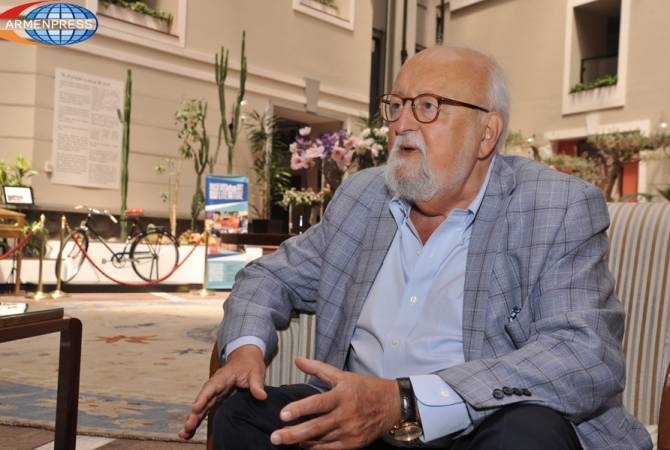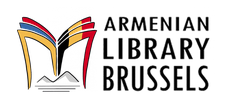Le compositeur polonais d’origine arménienne Krzysztof Penderecki est décédé le 29 mars 2020 à 86 ans. En 2015, il avait dédié une œuvre au génocide des Arméniens, interprétée au Carnegie Hall de New York. En février 2019, il accordait une interview au journaliste Mark Grigorian de la Radio Publique d’Arménie venu en reportage en Pologne, interview publiée en avril 2019 par Culture.Pl.
https://culture.pl/en/article/a-conversation-with-composer-krzysztof-penderecki
"A Conversation with Composer Krzysztof Penderecki" - Culture.pl – 01/04/2019
Renowned Armenian journalist Mark Grigorian speaks with Krzysztof Penderecki, who is widely considered to be Poland's greatest composer. In this discussion, Penderecki touches on a variety of topics – from his warm memories of his Armenian grandmother to the early influence of Bach on his musical development.
One of the most outstanding musicians of our generation, Krzysztof Penderecki is the winner of dozens of awards, holds an honorary doctorate, and is also a member of numerous academies. As a composer, Penderecki’s work is often characterised as bright, riveting, expressive and innovative, and his composing style as inventive and unconventional, while true to the fundamentals of music. Soon after we did this interview, a symposium was devoted to the work of Penderecki was held at the Music and Arts University of Vienna (MUK).
We sat around an old table in a spacious drawing room and drank tea. Elżbieta Penderecka, his wife, also took part in our conversation. A well-known figure in the world of musical culture, Penderecka is the creator and director of a Beethoven festival and has founded several orchestras.
Penderecki’s Armenian grandmother
Mark Grigorian: In many interviews, you’ve spoken about how you came from a multicultural background. You had an Armenian grandmother and a German grandfather. You lived and were raised in a Jewish neighbourhood…
Krzysztof Penderecki: Yes, but I’m not Jewish. But it’s true, the small city where I grew up was about 70% Jewish. I even spoke a little bit of Yiddish.
Penderecki was born in the small Polish town of Dębica, which has a population under 50,000 people. Dębica is located in the southeastern part of the country, not far from Kraków; Lviv, Ukraine; and Prešov, Slovakia. It is a truly multinational area of Eastern Europe.
MG: I noticed you’ve always said that you have an Armenian grandmother, but you’ve never spoken much about her.
KP: Well, her father was Armenian. And you know, in our grandmother’s home, everything was according to Armenian tradition, although she didn’t speak the language. She was born in eastern Poland, in the city of Stanisławów. I don’t know what it’s called now.
The city was known as Stanisławów until the beginning of World War II. It was renamed Stanislav when Soviet forces took Eastern Poland on 17 September 1939. From 1962, it became known as Ivano-Frankivsk. The city was founded in 1662, and from the very beginning, a large Armenian community resided there. It’s known that the first (wooden) building of the Armenian-Catholic Church of the Immaculate Conception of the Blessed Virgin Mary was erected in 1669. In the 19th century, Armenians made up 10% of the city’s population.
MG: Children often have very special bonds with their grandmothers. Did you?
KP: Yes, she was a wonderful person, very warm. And very caring. Like a grandmother is supposed to be. We were very close, because we lived in the same city for some time.
Elżbieta Penderecka: I met Krzysztof’s grandmother. She was 95 years old. At that time, she was living in Silesia, in the city of Zabrze. She was a very attractive woman. Very kind. But she passed away shortly after that, about two years later. It was 1967 or 1968, I think.
Krzysztof Penderecki’s grandmother’s name was Eugenia Siłkiewicz. She attended the Armenian cathedral in Kraków – on Sundays and holidays, she would travel there from Dębica for mass.
I feel that a part of me is there…
MG: You’ve been to Armenia many times…
KP: I think twice.
EP: No, Krzysztof, you’ve visited Armenia at least four times, and I’ve visited almost 10 times by now, because every year I go to the Aram Khachaturian International Competition. Krzysztof goes to Armenia whenever his works are performed there, or when he’s invited to conduct.
MG: Perhaps you go there in an attempt to find your Armenian roots? Or do your trips have a purely professional character? Or perhaps a little of both?
KP: I feel like a part of me is there. Just like there’s a part of me in Germany, because my great-grandfather was German – and in the city where my grandmother lived, where my father was born. So, I’m quite a mix.
MG: Many years ago, during one of your visits to Armenia, you asked Sergey Balasanian to give you the scores to the Armenian mass.
KP: Yes.
MG: Did it play any role in your music?
KP: No, no. Remember, by that time, I already had my own musical language. When I was young, I was still searching for my roots – but later on, I was set.
MG: But you read through the score and absorbed it in some way?
EP: Krzysztof wrote a piece about the Armenian Genocide. It was an a capella piece, written for the anniversary of the genocide, and in it, you could feel the influence of Armenian music. Maybe this influence came from something later, but most likely it came from the impression of that Armenian mass.
Penderecka is talking about the piece Psalm No. 3. It was first performed by the Hover Chamber Choir in May 2015 at Carnegie Hall in New York at a concert dedicated to the 100th anniversary of the Armenian Genocide. It is a tragic appeal to God and a plea for help.
Traditions and influences
MG: Many traditions and influences have come together in your music. There’s the Catholic tradition, Orthodox tradition (‘Utrenja’ and ‘Song of the Cherubim’). There’s also the Jewish tradition, with Eastern European klezmer…
EP: And not only that…
MG: And not only that. There’s also the Polish-French tradition, through Chopin. And it creates such a mixture… How do you find your own musical language within that mixture?
KP: My musical language has changed more than few times. From the very beginning, I was very much influenced by the great tradition of Bach and Beethoven…
MG: So, the German tradition.
KP: Yes. Oh, yes. As a matter of fact, we did live in Germany between 1966 and 1971.
EP: First, we lived in Essen, where Krzysztof was a professor at the Folkwang Academy, and then we moved to Berlin, where he had the DAAD scholarship. Then, we lived for a year and a half in Austria, in Vienna. After that, we moved to the United States.
KP: You know, all my life I wanted to write my own music, without any influences. Though, of course, there were influences. It’s impossible to write music that doesn’t have any influences.
MG: Well, of course, that’s the foundation, on which you build your own house.
KP: The foundation is certainly the German musical tradition. Bach, first and foremost.
MG: You were influenced by Bach, and yet you were writing this avant-garde music…
KP: Yes! But being influenced by him doesn’t mean that I was imitating him. I tried to write my own kind of music. And all these years, I’ve done so – I’ve been writing for over half a century.
MG: Would you say that you write Polish music? Or that it’s broader, that it’s European music?
KP: More European. When I was younger, I did take from Polish folk songs, but that was a very short time. You ought to look elsewhere for the influence on my music. And if it exists – and of course, it does, it would be from the German polyphonists. There was a period where I really liked French music. And Russian, of course! Mussorgsky, Tchaikovsky…
MG: Any English composers? Like Elgar, for instance?
KP: Oh no. Not at all. You know, Elgar isn’t a popular composer in Poland – not like in England, of course, or some other places. Polish tradition is based more on German music.
MG: In Soviet times, those of us in the USSR were almost completely cut off from the Western world by the Iron Curtain. But the window to the West was a little bit wider here than what we had. And you had the opportunity to speak with your colleagues…
KP: Oh yes. That and the opportunity to live outside of Poland. Now, there is a big difference between the Russian and Polish traditions.
MG: You once said that classical music is written for trained listeners. That it’s not necessarily an elitist artform, but there is a problem of understanding, since there aren’t many trained listeners. How important is it for you that the audience, the public understands your music? The people on the street, so to say. Not sophisticated critics, but ordinary people.
KP: You know, in my long life I’ve said many things that I wouldn’t repeat today.
MG: That’s completely normal. We all change.
KP: Of course. Years ago, I wasn’t too worried how my music was perceived.
EP: We recently returned from Szczecin, where Seven Gates of Jerusalem was being performed. The hall was full. People on the streets stopped my husband to say how they’d been so moved by the work. Of course, the audience is very important for Krzysztof. It’s important that his music is appreciated, understood and heard.
MG: When you write music, does some plot or story develop in your head, one that you would like to convey through the music?
KP: No. For me, music is pure abstraction. I try not to do this.
MG: And that’s the difference between music and poetry, or even paintings, because even paintings often tell stories. But when I listen to music – I’m constructing a story in my mind. It may be that music is abstract, but when I listen to it, I translate it as a story…
KP: You could find everything in my music. Even what you said. My music has been changing over these 50 years. Almost every season, it’s been a little bit different.
MG: Could you be called a postmodern composer?
KP: You could call me that. But I don’t even know, it’s all the same to me…
Without them, music wouldn't be the same
MG: What are some pieces that music today would be completely different without? Pieces that changed music itself, or how you relate to it.
KP: Let’s name some composers, not pieces.
MG: Alright.
KP: Beethoven. For me, he has always been and remains a very important composer, even though I don’t write in his style aesthetically. But I consider Beethoven – actually, German music – the most important phase of my work. I studied German pieces, their polyphony, and this changed my musical life.
MG: Beethoven as a symphonist, or his later quarter pieces?
KP: His symphonies. Of course, the later quartets are absolutely brilliant pieces, but I turned to these later on – not during the earlier period of my work, when I was a student and then a young composer. At that time, I probably didn’t even understand them.
MG: So, Beethoven. Who else?
KP: Bach, but there were many others. Debussy, for instance; Ravel; I studied their music later on. Then Mussorgsky, who had a very strong influence on me. Mussorgsky was a genius. Shostakovich. Messiaen, perhaps… but not as much as the others.
MG: Prokofiev?
KP: Yes. Wonderful music. There is so much light in Prokofiev’s music… And he has such a fantastic sense of musical humour.
MG: And which of your pieces would you call the pinnacle of your work?
KP: Oh, that’s a very difficult question. But one of the most important, maybe even the most important work for me is St. Luke’s Passion. I was young, I wanted to discover the world, and those years, the 1960s, were a time of cultural revolution in Poland. And I was a part of that revolution. For me, those years – the late 1950s and early 1960s – were the most fruitful.
MG: Have you ever thought about returning to avant-garde music? Like what you wrote in the 1960s?
KP: No, this is passé. Without avant-garde, which I discovered quite early, I wouldn’t have been able to develop as a composer. And now – it is a thing of the past!
Interview conducted by Mark Grigorian, Feb 2019. The renowned Armenian journalist came to Poland to conduct a series of interviews with prominent figures of Polish culture for Public Radio of Armenia by invitation from Culture.pl and the Open Poland programme. Originally written up in Russian; text translated by KA, Mar 2019.
 Français
Français  Nederlands
Nederlands  Հայերեն
Հայերեն 

